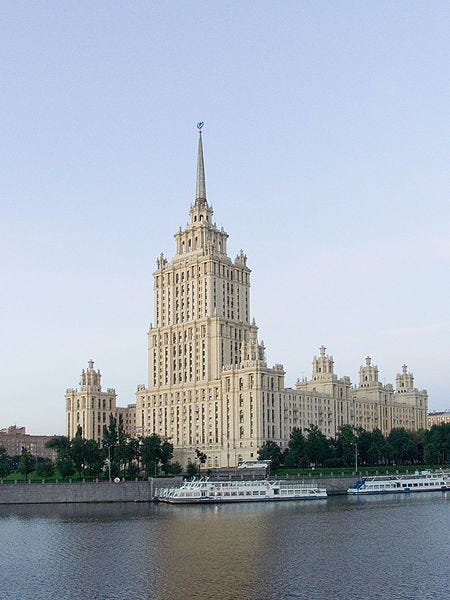I made long visits to Moscow in the 1980’s. Those years saw the beginning of the end of the old Soviet era. I stayed in the Ukraina Hotel and there I met Victor. A young man with a moustache so precise it seemed he’d sketched it on his upper lip with a burnt match. He wore the distracted look of an ambitious, if disillusioned, dreamer. Especially at odds in his young face were his middle-aged eyes.
Victor called himself a waiter. But he no more resembled a waiter than the Ukraina was ever a convincing hotel. He chose to spell his name not with the usual ‘k’ in the middle but with ‘c’. ‘As in capitalism,’ he explained. When I told Victor I was writing a book about Moscow, he said I’d never pull it off. ‘Your mind is too Anglo-Saxon', he told me. ‘Like a lawnmower.’
The Ukraina Hotel was so named as a gesture of friendship towards a country that Russia once regarded as personal property and which it is presently invading. A brooding skyscraper on the Moskva River, the Ukraina is one of seven similar extravagances spread around Moscow, built during Stalin’s reign. These all form a giant heptagon, in an architectural style sometimes called Stalin Baroque or Soviet Rococo. After the collapse of Soviet communism, the Ukraina was smartened up, but the facelift does not soften its baleful hauteur.
Ukraina Hotel Moscow
Breakfast at the Ukraina was served in a huge room, heavy with waiters like Victor and thick with elaborate menus covered in an inky script, listing unavailable dishes. Fellow diners behaved like creatures at the Mad Hatter’s tea party in Alice in Wonderland, spreading themselves out over many chairs, in the great echoing barn of a dining room, pretending there was no more room!
Although Victor pretended to be a waiter, he really wanted to be a stockbroker or to deal in junk bonds and to live in a condominium. He had learnt English by trading roubles for whatever hard currency foreign tourists in the hotel might be carrying. At the time, one pound sterling bought one rouble, at the official rate and Victor offered seven. I said no to his roubles and asked instead for eggs.’
‘There are no eggs. I can get you caviar at a good price.’
When I turned that down, he said, ‘If you don’t want roubles and you don’t want caviar, what do you want? If eggs are your concern, you will never understand how we really are in Moscow.’
I said If he would keep me up to speed on how the things really were in Moscow, starting with the Ukraina hotel, then we had a deal. Why were the other waiters skulking in corners and ignoring hungry guests? Why were so many dishes on the menu marked ‘Not Available’. Where was the coffee?’
Victor was pleased. We were almost on the same wavelength.
‘There is no coffee. For that we must find Café Potemkin.’
We took the lift to some floor I’d not seen. Victor led me to a quiet, curtained room, with samovars of tea and large urns of surprisingly good coffee. Here was Café Potemkin, said Victor, and it catered for ‘the overflow’, at times when all else failed in the breakfast room or was abruptly closed for repairs, for deliveries, or for no reason at all. Café Potemkin popped into existence unannounced in different locations in the hotel, it was ‘ad hoc’, ‘temporary', and ‘just for the moment’. It was never easy to find because otherwise everyone would want to use it. Someone made it happen but Victor did not know who that was. Customers helped themselves and left a few coins in a saucer. I said that surely someone must run it, supply it, manage it?
‘If I believe in God,’ asked Victor, ‘do I need to see him?’
The Potemkin legend resounds in Russia because it speaks so deeply of the place itself. Did Catherine the Great really sail past villages that were just painted backdrops packed with cheering peasants. And were the peasants and their animals rushed to the next village to cheer the Empress, as she passed by again? Probably not, say the more boring critics. But in Russia, just because something never happened, does not mean it cannot be true.
There are ways of understanding what the powerful say, Victor liked to repeat. ‘Maybe it is all lies. That’s their job. Our job is to decide how to believe them. The best lie is sometimes the truth.’
Next morning, the breakfast room was closed. The glass doors were roped together, and guests stood around helplessly. Some waved, some tapped on the glass to get the attention of the waiters who were sitting down at the tables. The waiters turned their backs and showed no sign of hearing or seeing the crowd beyond the glass doors.
Victor turned up in the lobby.
‘Why is the breakfast room locked?’
‘Today is spring cleaning, dining room closed. Breakfast is in another room, on another floor of the hotel.’
‘How will they know?’
‘The hungry will find a way. Let us find Café Potemkin.’
Christopher Hope






Having lived in the USSR in the 80s, this story resonates.